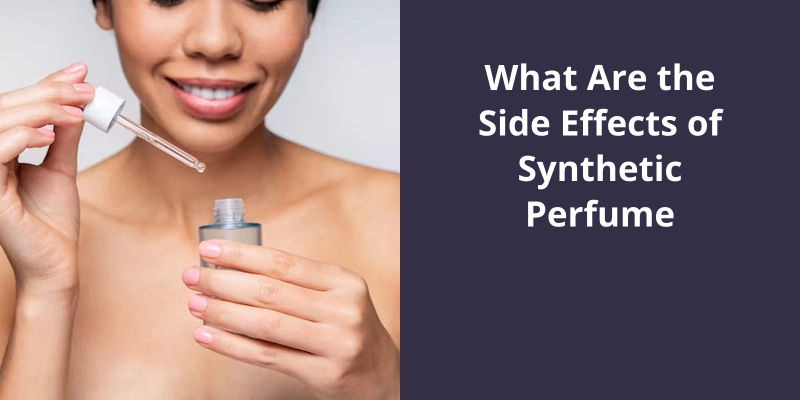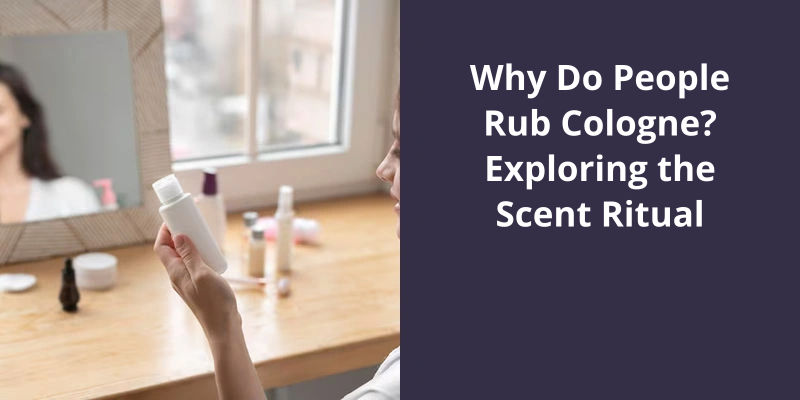The side effects of synthetic perfume can be numerous and detrimental to both human health and the environment. Synthetic perfumes are often made from petrochemicals, which might cause allergic reactions such as skin irritation, rashes, and hives as well as respiratory issues like asthma and migraines. They can also disrupt hormones, leading to problems such as thyroid dysfunction and reproductive health issues. Some types of synthetic perfumes can even have carcinogenic properties, contributing to cancer development. Not only do people wearing the perfume experience these side effects, but those nearby can also be affected due to the airborne nature of the scent. Moreover, they may not be environmentally friendly as these synthetic chemicals can harm wildlife and ecosystems when they enter the water system.

What Are the Disadvantages of Synthetic Perfume?
What’re the disadvantages of synthetic perfume? Synthetic perfumes can have various side effects on individuals, with allergic reactions being one of the most common. Certain people may experience rashes, skin irritation, or even dermatitis when exposed to synthetic fragrances. Moreover, some individuals may develop respiratory issues, such as difficulty breathing or asthma symptoms, due to the inhalation of synthetic perfume particles.
Beyond skin and respiratory reactions, synthetic fragrances can also cause dizziness and headaches in sensitive individuals. Additionally, some synthetic fragrance ingredients have been found to be potentially hazardous or toxic when examined in scientific studies.
Studies have shown that specific ingredients in synthetic perfumes, such as phthalates and synthetic musks, can be especially problematic. Phthalates are commonly used to extend the longevity of fragrance, but they’ve been linked to endocrine disruption, reproductive issues, and even certain types of cancer. Synthetic musks, on the other hand, can accumulate in the body and have been detected in breast milk, posing potential risks to infants.
When washed off or disposed of down the drain, these chemicals can accumulate in water bodies, potentially disrupting ecosystems and harming aquatic life.
Opting for natural, organic, or fragrance-free alternatives can be a safer option, reducing the chance of triggering allergic reactions or experiencing adverse health effects. By prioritizing products that use non-toxic ingredients, consumers can make more informed choices that protect their well-being and contribute to a healthier environment.
Synthetic fragrances, although commonly found in beauty products, may not be as beneficial for your skin as you might think. In fact, they’re known to be a leading cause of irritation and contact dermatitis. According to Dr. Jaliman, having a synthetic fragrance in a skincare product can actually undermine it’s effectiveness and pose a risk of irritation.
Is Synthetic Fragrance Good for Your Skin?
Synthetic fragrance may smell enticing, but it can wreak havoc on your skin. While natural fragrances derived from essential oils may have some benefits, synthetic fragrances are often made up of numerous chemical compounds that can cause irritation and contact dermatitis.
This can lead to redness, itching, and even allergic reactions. Not only does it compromise the skins integrity, but it can also increase sensitivity and make existing skin conditions worse.
One of the biggest issues with synthetic fragrances is the lack of transparency when it comes to the ingredients used. Many companies don’t disclose the specific chemicals used in their fragrances, making it difficult for consumers to determine if certain ingredients may be harmful or toxic to their skin.
Consumer Education and Awareness: Provide Resources and Tips for Consumers to Become More Informed About the Potential Risks of Synthetic Fragrances and How to Make Safer Choices When Purchasing Fragrance-Containing Products.
- Research before you buy: Take the time to learn about the potential risks of synthetic fragrances and how they can impact your health.
- Read ingredient labels: Look for products that list specific natural ingredients, rather than just stating “fragrance” or “parfum.”
- Choose fragrance-free options: Opt for products that are labeled as “fragrance-free” to avoid any potential irritations or allergic reactions.
- Consider natural alternatives: Look for products that use essential oils or other natural ingredients for their scent, instead of synthetic fragrances.
- Look for certifications: Check for certifications such as “Certified Organic” or “Cruelty-Free” to ensure the product meets certain safety and ethical standards.
- Support transparent brands: Seek out companies that are transparent about their fragrance ingredients and provide detailed information about their sourcing and manufacturing processes.
- Avoid aerosol sprays: Try to avoid using aerosol sprays as they can contribute to air pollution and may contain harmful chemicals.
- Use fragrance-free cleaning products: Use fragrance-free detergents, fabric softeners, and household cleaners to minimize exposure to synthetic fragrances in your home.
- Educate yourself and others: Share the knowledge you acquire about synthetic fragrances with friends and family to help them make informed choices as well.
Source: The Truth About Fragrance-Free and Scented Beauty Products
Synthetic fragrances have long been a topic of concern due to the potentially harmful effects of the chemicals they contain. These chemicals, often derived from petroleum, have been linked to health issues such as endocrine disruption and even carcinogenesis. It’s essential to understand the potential risks associated with synthetic fragrances and take necessary precautions to protect our well-being.
Are Synthetic Fragrances Safe?
Are synthetic fragrances safe? This is a question that’s been asked by many concerned individuals. The truth is that many synthetic chemicals used in fragrances are derived from petroleum and can, in fact, be harmful to human health. One of the main concerns is the presence of phthalates in these fragrances. Phthalates are known to be endocrine disruptors, meaning they can interfere with the bodys hormonal system. This can lead to various health issues, including reproductive problems, developmental abnormalities, and even an increased risk of certain cancers.
Another alarming fact about synthetic fragrances is the presence of carcinogens. Benzophenone, for example, is a chemical commonly used in fragrances, and it’s been classified as a possible carcinogen by the International Agency for Research on Cancer. Exposure to such carcinogens can potentially increase the risk of developing cancer over time. Similarly, styrene, another chemical commonly found in synthetic fragrances, has been identified as a possible human carcinogen by several health and environmental organizations.
Many individuals experience allergic reactions, such as skin rashes, hives, or respiratory problems when exposed to synthetic fragrances. This can be particularly concerning for those with sensitive skin or existing respiratory conditions. Furthermore, the synthetic chemicals in fragrances can also have a negative impact on indoor air quality, potentially contributing to indoor air pollution and exacerbating respiratory issues for those affected.
Natural and Organic Fragrance Alternatives: Provide Information on Natural and Organic Fragrance Options as Alternatives to Synthetic Fragrances, Including Their Safety and Efficacy.
- Natural fragrance alternatives: Essential oils extracted from plants such as lavender, rose, and citrus fruits can be used as natural alternatives to synthetic fragrances.
- Organic fragrance options: Organic perfumes and colognes made from certified organic ingredients offer a non-toxic and eco-friendly alternative to conventional fragrances.
- Safety of natural and organic fragrances: Natural fragrance options are generally considered safe as they don’t contain harmful chemicals or synthetic additives. However, it’s essential to be cautious and check for any potential allergies or sensitivities to specific ingredients.
- Efficacy of natural and organic fragrances: While natural and organic fragrances may have slightly different scent profiles compared to synthetic options, they can still provide pleasant and long-lasting aromas.
- Benefits of choosing natural and organic: Opting for natural and organic fragrances helps minimize your exposure to potentially harmful chemicals found in synthetic alternatives. It also supports sustainable practices and reduces the environmental impact caused by conventional fragrance production.
These health risks associated with secret chemicals in fragrance have raised concerns among scientists and health professionals. From being classified as allergens and hormone disruptors to asthma triggers and neurotoxins, these chemicals pose serious threats to our well-being. Additionally, some fragrance ingredients have even been labeled as carcinogens, further highlighting the potential danger lurking in our favorite scents. It’s important to understand and address these hidden risks in order to safeguard our health.
What Are the Health Risks of Secret Chemicals in Fragrance?
What’re the health risks of secret chemicals in fragrance? Fragrances are linked to a staggering number of health risks. Across multiple research studies, chemicals used to make fragrances are classified as allergens, hormone disruptors, asthma triggers, neurotoxins, and carcinogens.
One of the main concerns with synthetic perfumes is the presence of allergens. These are substances that can cause allergic reactions in some individuals. Common allergens found in fragrances include limonene, linalool, and benzyl alcohol. For those with sensitive skin or respiratory conditions, exposure to these allergens can lead to symptoms like itching, rashes, wheezing, and difficulty breathing.
These chemicals have the potential to interfere with the normal functioning of hormones in the body, which can have wide-ranging effects. Studies have linked hormone disruptors found in fragrances to reproductive issues, such as decreased fertility and developmental abnormalities in offspring. They may also contribute to hormonal imbalances, mood disorders, and even certain types of cancer.
Another concern is the impact of synthetic perfume on asthma. Fragrances containing volatile organic compounds (VOCs) can trigger asthma symptoms in individuals who’re already prone to the condition. These VOCs, such as formaldehyde, can irritate the airways and lead to coughing, wheezing, and shortness of breath. For asthmatics, avoiding synthetic fragrances is crucial to maintaining good respiratory health.
Neurotoxicity is yet another risk associated with synthetic perfumes. Certain fragrance chemicals, such as phthalates, have been shown to have neurotoxic effects. These substances can damage the nervous system and potentially contribute to neurological disorders, including cognitive impairment and behavioral changes.
Lastly, some synthetic fragrance ingredients are classified as carcinogens, meaning they’ve the potential to cause cancer. For example, acetone, a common ingredient in many perfumes, has been linked to certain types of cancer in laboratory studies. Other known carcinogens found in fragrances include benzene and toluene. While the concentration of these substances in perfumes may be low, long-term and repeated exposure can increase the risk of developing cancer.
Overall, the side effects of synthetic perfumes can be significant and wide-ranging. Opting for natural, organic, or fragrance-free alternatives may be a safer choice for those concerned about the potential side effects of synthetic perfumes.
Conclusion
Fragrance chemicals used in perfumes have been associated with various disease symptoms, including neural disturbances such as headaches, depression, and migraines. Furthermore, worrisome links have been found between synthetic perfumes and serious conditions like breast cancer and polycystic ovary syndrome.





